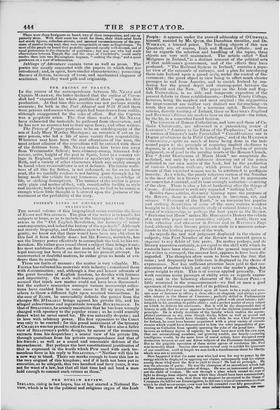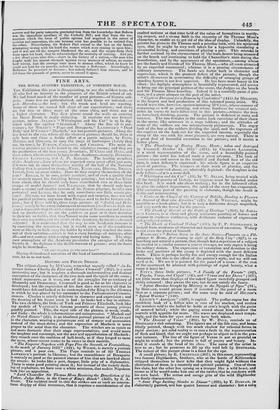THE DUBLIN REVIEW.
IRELAND, using in her hopes, has at last started a National Re- view, which is to be the political and religious organ of the Irish
People : it appears under the avowed editorship of 0Corrtgara. himself, assisted by Mr. Qum, the Danubian traveller, and Dr. WISEMAN, a learned priest. The leading objects of this new Quarterly are, of course, Irish and Roman Catholic : and so far as regards the selection and handling of the topics, these objects are very well maintained. The article called " Earl Mulgrave in Ireland," is a distinct account of the political acts of that nobleman's government, and of the effects they have produced. " The Railroad System in Ireland," contains a popu- lar view of the rationale of railways, and a plan for introducing them into Ireland upon a grand scale, under the control of Go- vernment ; the great object in view being to effect much shorter passages to and from America, and to enrich Ireland by ren- dering her the grand depiit and starting-point between the Old World and the New. The paper on the Irish and Eng- lish Universities, is an able and temperate exposition of the present defects in those establishments,—Dublin Trinity College, however, being the amplest and most original : the suggestions for improvement are neither very distinct nor far-reaching—in truth they are contracted by a sectarian spirit. Besides these articles, directly treating of Ireland, those on RAUMER'S England and BULWER'S Rienzi are made to bear on the subject—the latter, by the by, in a somewhat forced fashion.
The interests of Roman Catholicism, and here and there of Ca- tholic Christianity, are advocated in a painstaking review of LABORDE'S " Journey to the Edotn of the Prophecies;" as well as in notices of GERIIET'S truly Frenchified " Considerations sur he Dogma generateur de la Pike Catholique," and of the HAMPDEN Controversy,—quite as much of harm being done in the last- named paper to the principle of requiring implicit obedience to dogmas, in a church which is founded upon freedom of private judgment, as of good to the peculiar tenets of the Roman Church. The " Awful Disclosures of Maria Monk" are completely de- molished, not only by an elaborate drawing out of the points indicated in our own notice of the book, but by the production of various Canadian evidence, which proves that the lies and licence of that wretched woman are to be attributed to profligate insanity. As a whole, the purely religious section of the Number is the most able in a literary point of view ; but its arguments are somewhat Jesuitical, and its tone strongly sectarian—smacking of the shop. There is also a latent hankering after the things of Caesar. Endowment is evidently regarded " nothing loth."
Besides these articles, distinctly bearing upon the purposes of the Review, there is sufficient variety in literature, art, and science. " Economy of the Earth," is an irregular but popular and striking description of some of the more curious wonders brought to lOit by the scientific study of natural history ; and, in point of workmanship, is perhaps the best paper in the Review. " Ecciesiasfical Music " makes Mr. HOGARTH'S History the vehicle of a very able paper on am i interesting subject. Lastly, there are both criticism and chaiticter in 1?ienzi and in RAUATER'S Eng- land, although their literary points are made in a measure subor- dinate to the leading purposes of the work.
As regards the tact and judgment displayed in the choice of subjects, this First Number of the Review in emerald green is superior to any debfit of late years. Its matter perhaps, and its literary execution certainly, is not equal to the skill with which its contents have been chosen. Provided the general impression of the writer is conveyed, the manner how, appears to have been dis- regarded. The thoughts often seem to have been the first that came; and frequently too little care is displayed in the choice of expressions. Nor has sufficient attention been paid to that con- densation of matter which not only saves the reader's pains, but gives weight to style. This is of course applied generally. The work contains many passages of ability even as regards expres- sion ; and in the following character of Sir ROBERT PEEL—a little overrated in the commencement—we find at once a good specimen of its composition and of its political tone.
Sir Robert Peel must be admitted upon all hands to be a ready and accu- rate man of business in office ; a clear, often an eloquent, and always a plau- sible debater in the house of Commons ; perfectly skilled in Parliamentary tactics ; a fair and even a generous oppponent ; gifted with great talents; inde- fatigable in his attention to public affairs; and a perfect master Of every subject on which he delivers his sentiments. But it will be the disagreeable duty of history to add, that he never appears to have had the slightest consciousness of principle. He is wholly destitute of the faculty which enables the accom- plished statesman to see, even though dimly, before as well as around and behind him. One should have thought, that while he was Chief secretary for Ireland, he must have become acquainted with a great variety of circum- stances which would have demonstrated to him the utter impossibility of pre- venting us Catholics from speedily spurning the yoke of the penal laws. Had he even an ordinary degree of sagacity, he must have seen with his own eyes, that our accumulating numbers, our growing wealth, our hourly-increasing intelligence would, by the mere force of moral action, have dissipated every distinction between us and our fellow subjects of the Protestant denomination. But to the palpable operation of these active agents of revolution yr. Peel was incurably blind. Session after session served only to exhibit his ignorance of our condition, until at length we sent forth a simultaneous shout for liberty, which was not to resisted. How happened it that the same man who had won his way to power by the energy which he displayed in opposing our claims, subsequently took his station among those whol were the first to yield to them ? He had no principle. He was the advocate of party. He was the champion of an ascendancy which had no foundation in the natural order of things. He was an instrument of passion, not the child of wisdom. He saw through a glass which caused the rays of light to diverge from objects upon which they should have been concentrated; and the consequence was, that from the moment he presented to the House of Commons the bill for our Emancipation, he fell into a train of inconsistencies from which he shall never escape, even were his life extended over fifty generations. The same want of foresight, the same subservience to passion, the sane narrow zeal for party interests, precluded him from the knowledge that Reform was the immediate corollary of the Catholic Bill ; and thdt from the mo- mentum which the force of public opinion had acquired in the career of revision and reparation, the one became even less possible to he resisted than the other. Nevertheless, Sir Robert Peel waited to the last on the beach, attempting to stay with his hand the waters which were coming in upon him ; and it was not till the tempest blackened the air, and the surges flung their foam upon his head, that he acknowledged the necessity of retiring. And yet, a few short years after this,—short in the history of a nation,—the man who fought with his utmost strength against every measure of reform, no matter how trivial, had the courage once more to assume office, which he knew he could not hold for six months, unless be became a Reformer. Accordingly, a Reformer he proniiseil to become ; but nobody believed him sincere, and he fell from the pinnacle of power, never to ascend it again.



























 Previous page
Previous page